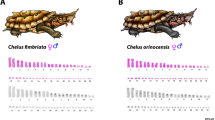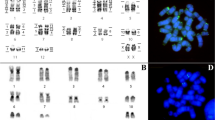Abstract
IN the past fifty years, several papers have described the chromosomes of Isopoda, and the numbers for twenty-seven species have been recorded. Most of this work has been done by Vandel1,2. The numbers range from 6 to 60 taking the group as a whole, but some families may show less variation than others5 :
This is a preview of subscription content, access via your institution
Access options
Subscribe to this journal
Receive 51 print issues and online access
$199.00 per year
only $3.90 per issue
Buy this article
- Purchase on Springer Link
- Instant access to full article PDF
Prices may be subject to local taxes which are calculated during checkout
Similar content being viewed by others
References
Vandel, A., C.R. Acad. Sci., Paris, 206 (1938).
Vandel, A., Biol. Bull. Fr. Belg., 81 (1947).
Racovitza, Archiv. Zoo. Exp., Paris, 52 (1919).
Chappuis, Archiv. Zoo. Exp., Paris, 86 (1949).
Makino, S., “A Review of Chromosome Numbers in Animals” (Tokyo, 1950).
Author information
Authors and Affiliations
Rights and permissions
About this article
Cite this article
MULDAL, S. An Isopod, Asellus meridianus Racovitza, with Low Chromosome Number. Nature 168, 1127–1128 (1951). https://doi.org/10.1038/1681127b0
Issue Date:
DOI: https://doi.org/10.1038/1681127b0
This article is cited by
-
The Genus Asellus in Britain
Nature (1962)
Comments
By submitting a comment you agree to abide by our Terms and Community Guidelines. If you find something abusive or that does not comply with our terms or guidelines please flag it as inappropriate.



